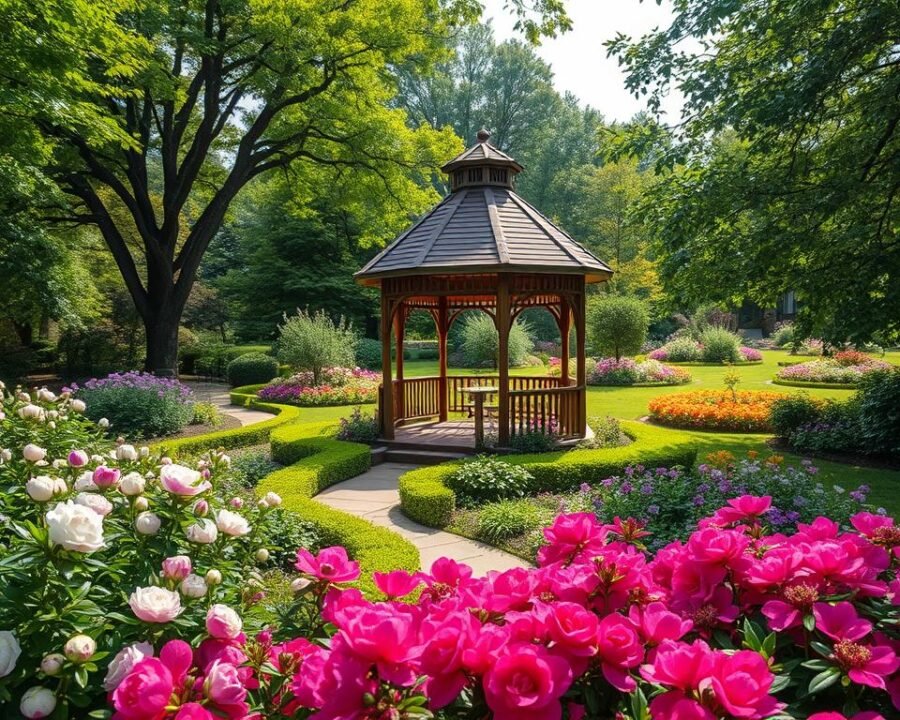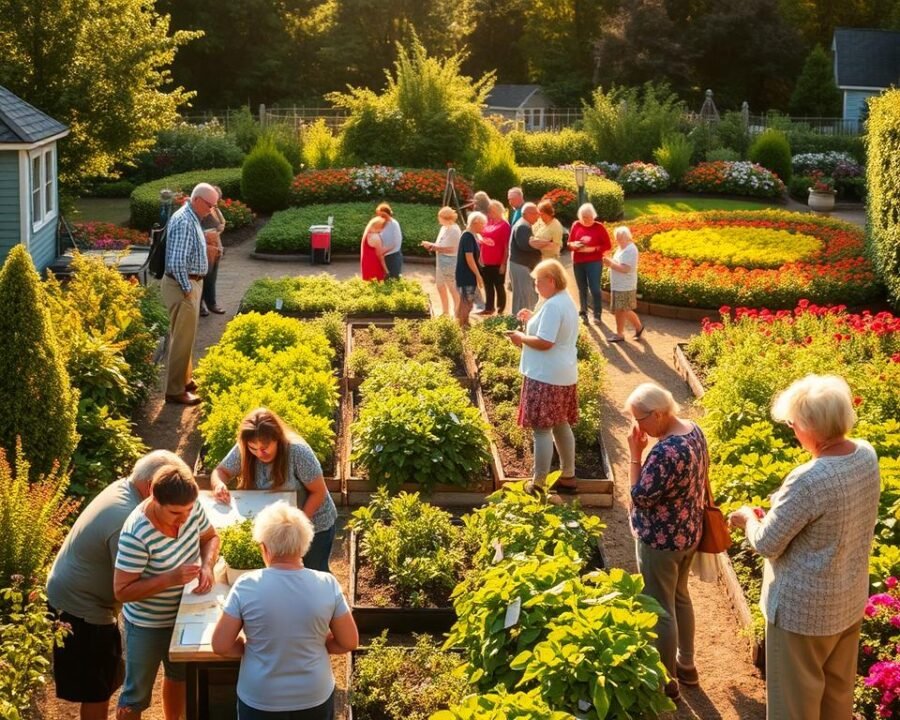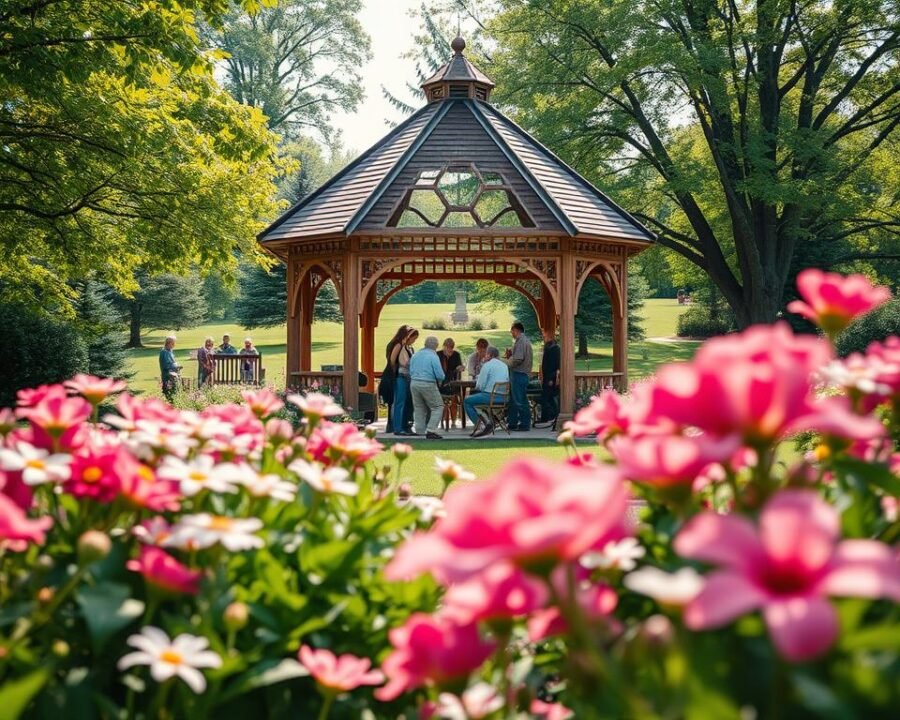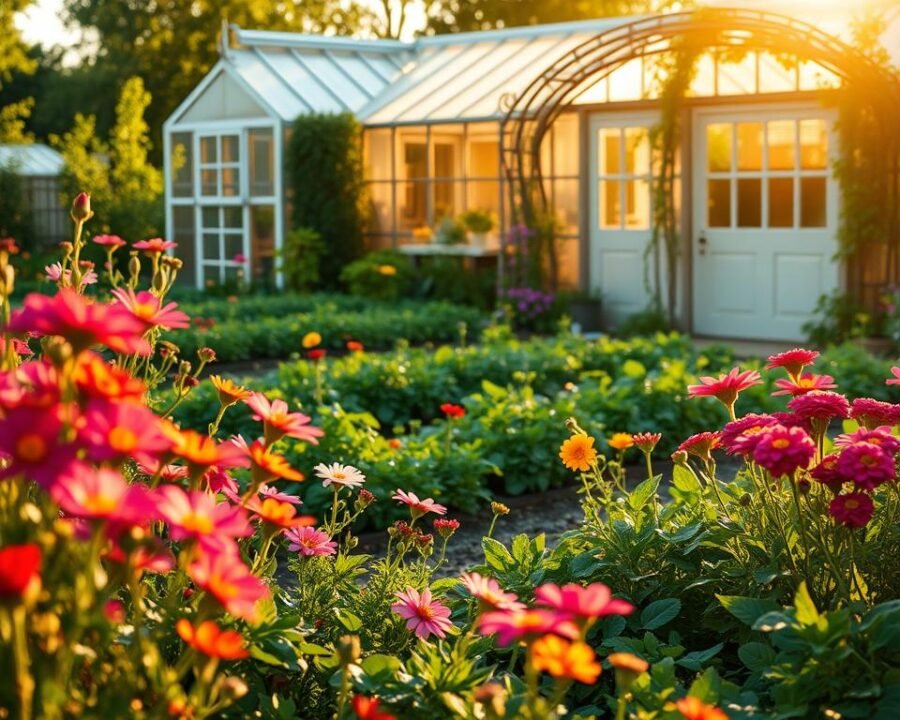Welcome to the Chapel Hill Garden Club: Nature’s Delight
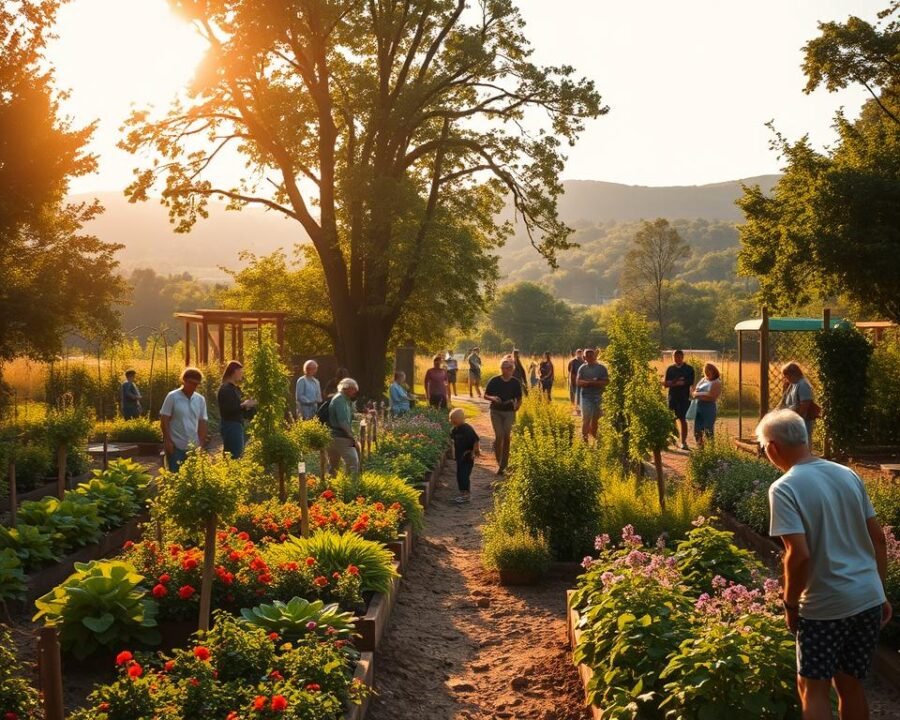
When we enter the world of gardening, we find a community that cares for plants and connects us to nature. The Chapel Hill Garden Club is a lively group of people. They share gardening tips, join in activities, and work to protect the environment.
We think that together, we can make our world greener and more sustainable for the future. Our goal is to encourage gardening and care for the environment in Chapel Hill. We welcome you to join us on this important journey.
Key Takeaways
- Discover a community of gardening enthusiasts
- Learn about the club’s mission and activities
- Understand the importance of environmental stewardship
- Find opportunities to participate in gardening activities
- Join a community that promotes sustainability
About the Chapel Hill Garden Club
For nearly a century, the Chapel Hill Garden Club has been spreading love for gardening and caring for our environment. Since 1931, we’ve become a key part of horticultural excellence in our community.
Our Mission and Vision
We aim to grow gardening, horticulture, and environmental care, while supporting garden lovers. We dream of a community filled with garden beauty and diversity. We want our members to make a difference in the environment.
To reach our goals, we focus on education, community service, and social activities. Our members enjoy workshops, lectures, and hands-on experiences. These help them grow their knowledge and skills.
A Brief History
Since 1931, the Chapel Hill Garden Club has led in gardening and environmental awareness. We’ve hosted many events, workshops, and projects. These have made our community more beautiful and sustainable.
| Year | Event | Impact |
|---|---|---|
| 1931 | Founding of the Chapel Hill Garden Club | Established a community of garden enthusiasts |
| 1950s | Initiated community garden projects | Promoted gardening and environmental awareness |
| 2010s | Expanded membership and events | Increased community engagement and outreach |
Membership Information
Joining the Chapel Hill Garden Club is a great way to meet other garden lovers, learn new things, and help the community. Members get access to exclusive events, workshops, and networking opportunities. To join, visit our website or contact us for details.
We have different membership types for everyone. Whether you’re an experienced gardener or new to it, we welcome you. Join us to support gardening and environmental care.
Benefits of Joining the Garden Club
Joining the Chapel Hill Garden Club offers many benefits for your gardening journey. Our club aims to build a community of garden lovers. It provides chances for growth and celebrates the joy of gardening.
Connect with Fellow Garden Enthusiasts
By joining, you meet others who love gardening as much as you do. We have events like our biennial Garden Tour. It shows off beautiful gardens and the North Carolina Botanical Garden.
Our members come from all walks of life. They share their gardening wisdom and experiences. You’ll make new friends and learn a lot.
“Gardening is a love affair with the earth, and being part of the Chapel Hill Garden Club has deepened my connection with nature and fellow gardeners.” –
Access to Exclusive Events and Workshops
Members get to attend special events and workshops. These are designed to improve your gardening skills. You’ll learn from experts and get hands-on experience.
Some events we host include:
- Monthly Meetings: Guest speakers share their gardening knowledge.
- Seasonal Planting Workshops: Learn how to plant and care for different plants.
- Garden Tours: Explore local gardens, including private ones and the North Carolina Botanical Garden.
Gardening Resources and Knowledge Sharing
We share knowledge and resources with our members. We believe in working together to grow as gardeners.
Here are some resources we offer:
| Resource | Description |
|---|---|
| Gardening Guides | Guides on gardening topics like plant care and garden design. |
| Seed and Plant Exchanges | Exchange seeds and plants with other members to diversify your garden. |
| Expert Advice | Get advice from experienced gardeners and horticulturists. |
Upcoming Events and Workshops
The Chapel Hill Garden Club is excited to share its upcoming events and workshops. As a member, you’ll enjoy a variety of activities. These include gardening, community service, and knowledge sharing.
Monthly Meetings and Guest Speakers
We hold monthly meetings with guest speakers who are experts in their fields. These meetings are a great chance to learn about new gardening trends and techniques. Our guest speakers include famous horticulturists, landscape designers, and environmental experts.
Topics have ranged from sustainable gardening to garden design and native plants. Our meetings are both informative and fun. We’re excited to share more knowledge with our members.
Seasonal Planting Workshops
Our seasonal planting workshops are a big part of our calendar. These workshops let members learn about different plants and flowers for each season. You’ll discover everything from spring bulbs to winter evergreens.
You’ll not only learn about the best plants for each season. You’ll also get to practice planting. Our workshops are led by experienced gardeners who love to share their knowledge.
Community Service Projects
At the Chapel Hill Garden Club, we believe in giving back. Our community service projects are a big part of what we do. We encourage members to join in on activities like park cleanups and community garden projects.
These projects help the community and bring members together. We invite you to join us in making Chapel Hill a more beautiful and sustainable place.
How to Get Involved with the Community
We invite you to join our vibrant Chapel Hill gardening community. Our garden club aims to spread love for gardening, teach about the environment, and connect with locals.
There are many ways to join in. Volunteering is a great option. We have projects like garden upkeep and event planning that need help. Volunteering lets you help the community, learn new things, and meet like-minded people.
Volunteer Opportunities
- Community garden maintenance
- Event planning and coordination
- Gardening workshops and demonstrations
We also value collaborations with local organizations. Working with other groups helps us do more and reach more people. These partnerships make our community stronger and more vibrant for everyone.
Collaborations with Local Organizations
Some of our current collaborations include:
| Organization | Project | Status |
|---|---|---|
| Chapel Hill Parks and Recreation | Community Garden Development | Ongoing |
| Local Schools | Gardening Education Programs | In Development |
Another great way to get involved is through gardening projects in schools. We help local schools start gardening programs. These programs teach kids about gardening, nutrition, and caring for the environment. They help kids learn and also promote healthy eating and environmental awareness.
Gardening Projects in Schools
Our school gardening projects are fun, educational, and engaging. We believe that teaching kids about gardening early on can help them appreciate nature and live healthier lives.
Seasonal Gardening Tips
Whether you’re a seasoned gardener or just starting, our seasonal gardening tips will help you. At the Chapel Hill Garden Club, we know that every season has its own needs. This is key to keeping your garden healthy and vibrant.
For more detailed gardening advice, check out our post on starting a garden. It offers great tips for gardeners at all levels.
Spring Planting Ideas
Spring is a time of renewal and growth. It’s the perfect season to refresh your garden. Here are some spring planting ideas to get you started:
- Plant colorful bulbs like tulips and daffodils.
- Incorporate native plants that attract pollinators.
- Start seedlings for vegetables and flowers.
Summer Maintenance Techniques
Summer can be tough on gardens, with heat and pests being major concerns. To keep your garden thriving, consider these summer maintenance techniques:
- Water your plants deeply but infrequently to encourage deep root growth.
- Use organic mulch to retain moisture and suppress weeds.
- Monitor your garden regularly for signs of pests or disease.
Fall Prep and Winter Care
As fall approaches, it’s essential to prepare your garden for the colder months. Here are some tips for fall prep and winter care:
- Clean up your garden by removing dead plants and debris.
- Plant spring bulbs and prepare soil for next year’s garden.
- Protect sensitive plants from frost and freezing temperatures.
By following these seasonal gardening tips, you’ll be well on your way to maintaining a beautiful garden. Stay tuned for more Chapel Hill Garden Club news and gardening resources to help you achieve your gardening goals.
Featured Garden Projects
Our members’ creativity and passion are on full display in our featured garden projects. The Chapel Hill Garden Club is a lively group of gardening lovers. We’re excited to share the latest projects and initiatives from our members.
Recent Club Achievements
Our club has made big strides in gardening knowledge and community involvement. We recently held a workshop on sustainable gardening practices that drew a big crowd. We also started a new community garden initiative for members to grow their own food.
Some of our recent achievements include:
- Working with local nurseries to give members special discounts on native plants
- Hosting a series of guided garden tours to show off our members’ diverse gardening styles
- Creating a detailed guide to gardening in Chapel Hill with tips for local gardeners
Spotlight on Members’ Gardens
We’re proud to highlight some of our members’ gardens. They showcase unique styles and creativity. From beautiful flower gardens to productive vegetable plots, our members’ gardens reflect their hard work and dedication.
| Member | Garden Type | Notable Features |
|---|---|---|
| Jane Doe | Flower Garden | Rare roses, native wildflowers |
| John Smith | Vegetable Garden | Heirloom tomatoes, organic herbs |
Community Garden Initiatives
Our community garden initiatives aim to spread gardening knowledge and provide resources. We believe gardening can unite people and help our environment.
Some of our community garden initiatives include:
- Creating community garden plots for members to grow their own food
- Hosting workshops and events to share gardening knowledge and build community
- Working with local groups to promote sustainable gardening
Sustainable Gardening Practices
The Chapel Hill Garden Club thinks sustainable gardening is key for a better environment. As we grow our gardens, we must do it gently on our planet.
Using organic gardening methods is a big part of this. We avoid harmful chemicals to make our gardens and the world around them healthier. Techniques like composting, crop rotation, and natural pest control help a lot.
Organic Gardening Methods
Organic gardening boosts soil health and brings in more life. It also helps make food systems better. By choosing organic, we cut down on harmful chemicals and make our gardens more balanced.
Organic gardening has many benefits:
- It makes soil better with compost and natural stuff
- It welcomes good bugs and tiny creatures
- It uses less chemicals, which is good for water and animals
Water Conservation Tips
Water conservation is also very important. We use less water with smart irrigation and plants that don’t need much water. Good ways to save water include:
| Technique | Description | Benefits |
|---|---|---|
| Drip Irrigation | Water goes straight to the roots | Less water lost to air and ground |
| Rainwater Harvesting | We save rainwater for plants | Less water from the city |
| Drought-Tolerant Plants | Plants that need little water | Less water and care needed |
Pollinator-Friendly Gardening
Making pollinator-friendly gardens is also key. We add plants that bees and butterflies love. This helps our local ecosystem and brings in more life. Tips for these gardens include:
“Plant a mix of flowers that bloom at different times. This gives pollinators food all season.”
For more on sustainable gardening and how to join, check out the North Carolina Botanical Garden’s Community Gardening.
The Benefits of Native Plants
Adding native plants to your garden brings many benefits. They need less care and help local wildlife. Native plants have grown to fit their areas well, making them perfect for gardens.
Why Choose Native Species?
Native plants are better than non-native ones in many ways. They need less care because they fit the local climate and soil. This means you won’t have to water, prune, or fertilize as much.
They also help local animals by giving them food and shelter. This includes bees, butterflies, and birds.
Choosing native plants helps the environment too. They keep the soil healthy and clean the water. Their deep roots stop soil erosion and make the soil better.
How to Incorporate Native Plants
Adding native plants to your garden is easy. First, check your garden’s soil, sunlight, and moisture. Pick plants that fit your garden’s needs and plant them like they’re in the wild.
Using native plants makes your garden diverse and strong. Mixing different plants creates a home for many animals and insects.
Resources for Native Plant Selection
Starting with native plants can be hard. But, there are many resources to help. Local nurseries and gardening clubs know a lot about native plants.
They can guide you on what to choose and how to care for them. Online tools like the USDA’s Native Plant Database are also helpful. They help you find plants that are right for your area.
A Guide to Local Flora and Fauna
Chapel Hill is home to a wide variety of plants and animals. These species are key to keeping our ecosystem in balance. The town’s unique mix of geography and climate supports many different types of life.
Common Trees and Shrubs in Chapel Hill
In Chapel Hill, you’ll find many types of trees, like oak, hickory, and pine. These trees give us shade, clean the air, and help local animals. Shrubs like beautyberry, dogwood, and azalea also add to the area’s beauty.
- Oak trees give acorns, a food source for local animals.
- Hickory trees are home to many insects, important for our food chain.
- Pine trees provide shelter for various animals.
Beautiful Blooming Flowers in the Area
Chapel Hill is famous for its colorful flowers that bloom all year. You’ll see dogwood, azalea, and black-eyed susans in bloom. These flowers make the area beautiful and help pollinators.
- Dogwood flowers bloom in the spring, creating a beautiful view.
- Azalea flowers bloom in bright colors, attracting pollinators and enhancing the area’s beauty.
- Black-eyed susans bloom in the summer, adding a cheerful touch.
Local Wildlife and Their Importance
The wildlife in Chapel Hill is crucial for our ecosystem. Birds, bees, and butterflies are important pollinators. Deer, rabbits, and squirrels help make our area diverse. We must protect these species for a healthy environment.
| Species | Importance |
|---|---|
| Birds | Pollination and pest control |
| Bees | Pollination |
| Butterflies | Pollination and ecosystem health |
Join Us Today!
We invite you to join the Chapel Hill Garden Club. We focus on horticulture, floral design, and environmental conservation. Our club has a rich history, starting in 1931.
Our club began with 43 members. It has grown to over 150 members today. We have meetings, lectures, field trips, and more. These activities help us bond and learn together.
Our club is special because we teach about gardening and design. You can read about our history on our website.
How to Become a Member
Anyone interested in gardening and conservation can join. Just visit our website and fill out the application. We can’t wait to welcome you!
Membership Fees and Benefits
Our membership fees are fair. You get to join exclusive events and workshops. Plus, you’ll meet other gardening fans.
Stay Updated with Our Newsletter
Subscribe to our newsletter for event updates and tips. We’re excited to share our love for gardening with you. Join us and see the benefits of being part of the Chapel Hill Garden Club.
FAQ
What is the mission of the Chapel Hill Garden Club?
Our mission is to support gardening and protect the environment in Chapel Hill. We offer a community, educational resources, and chances to help with local gardening projects.
How do I join the Chapel Hill Garden Club?
Join by visiting our website, filling out the membership form, and paying the annual fee. We welcome gardeners of all levels and backgrounds.
What types of events and workshops does the club organize?
We have monthly meetings, seasonal planting workshops, and community service projects. Our events aim to educate, inspire, and unite our members.
Can I volunteer with the garden club?
Yes, we offer various volunteer opportunities. This includes working with local organizations and schools. Contact us to learn more about our current projects.
What are the benefits of using native plants in my garden?
Native plants need less care because they fit our local climate and soil. They also support local wildlife and save water.
How can I stay updated with the club’s activities?
Subscribe to our newsletter to get updates on events, workshops, and news from the Chapel Hill Garden Club.
What are the membership fees, and what do they cover?
Membership fees give you access to exclusive events, workshops, and educational resources. They also support our community projects. Contact us for details on our current fees.
Can I participate in gardening projects in schools?
Yes, our school gardening projects are open to everyone. We aim to teach children about gardening and the environment.
How can I learn more about sustainable gardening practices?
We offer workshops, meetings, and online resources on sustainable gardening. Topics include organic gardening, water conservation, and gardening for pollinators.
What are some common trees and shrubs found in Chapel Hill?
Chapel Hill is home to many plants, like oak trees, dogwood trees, and azalea shrubs. We can give you more information on local plants and wildlife.
